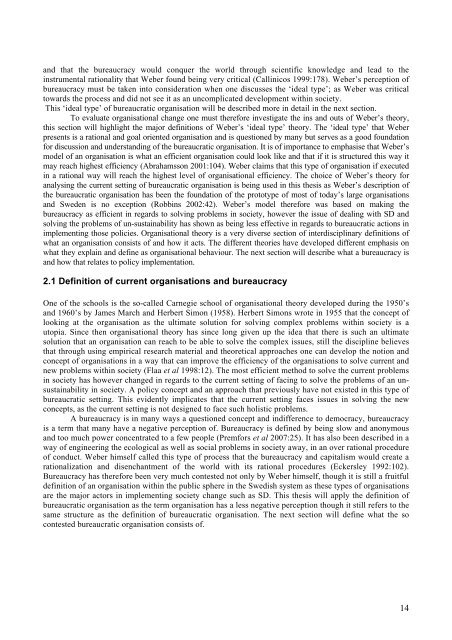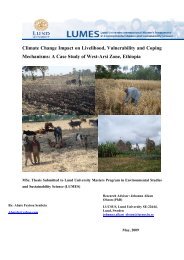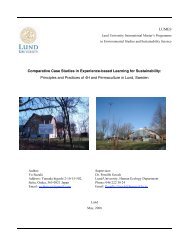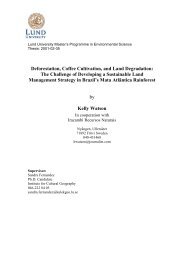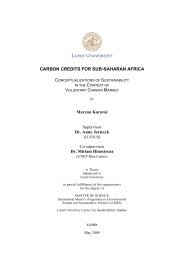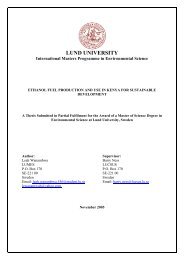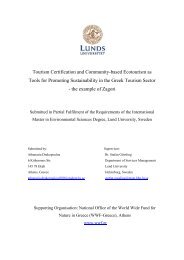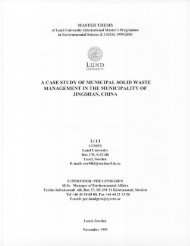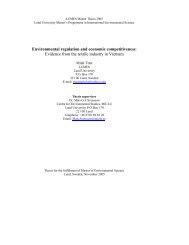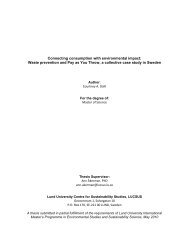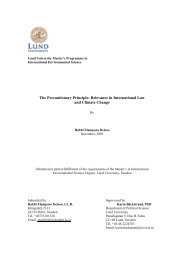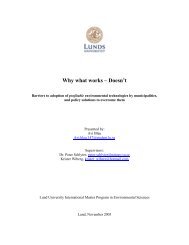From 'grey to green'- investigating the capabilities of the ... - lumes
From 'grey to green'- investigating the capabilities of the ... - lumes
From 'grey to green'- investigating the capabilities of the ... - lumes
You also want an ePaper? Increase the reach of your titles
YUMPU automatically turns print PDFs into web optimized ePapers that Google loves.
and that <strong>the</strong> bureaucracy would conquer <strong>the</strong> world through scientific knowledge and lead <strong>to</strong> <strong>the</strong>instrumental rationality that Weber found being very critical (Callinicos 1999:178). Weber’s perception <strong>of</strong>bureaucracy must be taken in<strong>to</strong> consideration when one discusses <strong>the</strong> ‘ideal type’; as Weber was critical<strong>to</strong>wards <strong>the</strong> process and did not see it as an uncomplicated development within society.This ‘ideal type’ <strong>of</strong> bureaucratic organisation will be described more in detail in <strong>the</strong> next section.To evaluate organisational change one must <strong>the</strong>refore investigate <strong>the</strong> ins and outs <strong>of</strong> Weber’s <strong>the</strong>ory,this section will highlight <strong>the</strong> major definitions <strong>of</strong> Weber’s ‘ideal type’ <strong>the</strong>ory. The ‘ideal type’ that Weberpresents is a rational and goal oriented organisation and is questioned by many but serves as a good foundationfor discussion and understanding <strong>of</strong> <strong>the</strong> bureaucratic organisation. It is <strong>of</strong> importance <strong>to</strong> emphasise that Weber’smodel <strong>of</strong> an organisation is what an efficient organisation could look like and that if it is structured this way itmay reach highest efficiency (Abrahamsson 2001:104). Weber claims that this type <strong>of</strong> organisation if executedin a rational way will reach <strong>the</strong> highest level <strong>of</strong> organisational efficiency. The choice <strong>of</strong> Weber’s <strong>the</strong>ory foranalysing <strong>the</strong> current setting <strong>of</strong> bureaucratic organisation is being used in this <strong>the</strong>sis as Weber’s description <strong>of</strong><strong>the</strong> bureaucratic organisation has been <strong>the</strong> foundation <strong>of</strong> <strong>the</strong> pro<strong>to</strong>type <strong>of</strong> most <strong>of</strong> <strong>to</strong>day’s large organisationsand Sweden is no exception (Robbins 2002:42). Weber’s model <strong>the</strong>refore was based on making <strong>the</strong>bureaucracy as efficient in regards <strong>to</strong> solving problems in society, however <strong>the</strong> issue <strong>of</strong> dealing with SD andsolving <strong>the</strong> problems <strong>of</strong> un-sustainability has shown as being less effective in regards <strong>to</strong> bureaucratic actions inimplementing those policies. Organisational <strong>the</strong>ory is a very diverse section <strong>of</strong> interdisciplinary definitions <strong>of</strong>what an organisation consists <strong>of</strong> and how it acts. The different <strong>the</strong>ories have developed different emphasis onwhat <strong>the</strong>y explain and define as organisational behaviour. The next section will describe what a bureaucracy isand how that relates <strong>to</strong> policy implementation.2.1 Definition <strong>of</strong> current organisations and bureaucracyOne <strong>of</strong> <strong>the</strong> schools is <strong>the</strong> so-called Carnegie school <strong>of</strong> organisational <strong>the</strong>ory developed during <strong>the</strong> 1950’sand 1960’s by James March and Herbert Simon (1958). Herbert Simons wrote in 1955 that <strong>the</strong> concept <strong>of</strong>looking at <strong>the</strong> organisation as <strong>the</strong> ultimate solution for solving complex problems within society is au<strong>to</strong>pia. Since <strong>the</strong>n organisational <strong>the</strong>ory has since long given up <strong>the</strong> idea that <strong>the</strong>re is such an ultimatesolution that an organisation can reach <strong>to</strong> be able <strong>to</strong> solve <strong>the</strong> complex issues, still <strong>the</strong> discipline believesthat through using empirical research material and <strong>the</strong>oretical approaches one can develop <strong>the</strong> notion andconcept <strong>of</strong> organisations in a way that can improve <strong>the</strong> efficiency <strong>of</strong> <strong>the</strong> organisations <strong>to</strong> solve current andnew problems within society (Flaa et al 1998:12). The most efficient method <strong>to</strong> solve <strong>the</strong> current problemsin society has however changed in regards <strong>to</strong> <strong>the</strong> current setting <strong>of</strong> facing <strong>to</strong> solve <strong>the</strong> problems <strong>of</strong> an unsustainabilityin society. A policy concept and an approach that previously have not existed in this type <strong>of</strong>bureaucratic setting. This evidently implicates that <strong>the</strong> current setting faces issues in solving <strong>the</strong> newconcepts, as <strong>the</strong> current setting is not designed <strong>to</strong> face such holistic problems.A bureaucracy is in many ways a questioned concept and indifference <strong>to</strong> democracy, bureaucracyis a term that many have a negative perception <strong>of</strong>. Bureaucracy is defined by being slow and anonymousand <strong>to</strong>o much power concentrated <strong>to</strong> a few people (Premfors et al 2007:25). It has also been described in away <strong>of</strong> engineering <strong>the</strong> ecological as well as social problems in society away, in an over rational procedure<strong>of</strong> conduct. Weber himself called this type <strong>of</strong> process that <strong>the</strong> bureaucracy and capitalism would create arationalization and disenchantment <strong>of</strong> <strong>the</strong> world with its rational procedures (Eckersley 1992:102).Bureaucracy has <strong>the</strong>refore been very much contested not only by Weber himself, though it is still a fruitfuldefinition <strong>of</strong> an organisation within <strong>the</strong> public sphere in <strong>the</strong> Swedish system as <strong>the</strong>se types <strong>of</strong> organisationsare <strong>the</strong> major ac<strong>to</strong>rs in implementing society change such as SD. This <strong>the</strong>sis will apply <strong>the</strong> definition <strong>of</strong>bureaucratic organisation as <strong>the</strong> term organisation has a less negative perception though it still refers <strong>to</strong> <strong>the</strong>same structure as <strong>the</strong> definition <strong>of</strong> bureaucratic organisation. The next section will define what <strong>the</strong> socontested bureaucratic organisation consists <strong>of</strong>.14


